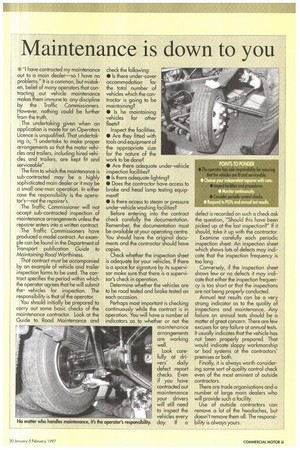Maintenance is down to you
Page 33

If you've noticed an error in this article please click here to report it so we can fix it.
-I have contracted my maintenance out to a main dealer—so I have no problems." It is a common, but mistaken, belief of many operators that contracting out vehicle maintenance makes them immune to any discipline by the Traffic Commissioners. However, nothing could be further from the truth.
The undertaking given when an application is made for an Operators Licence is unqualified. That undertaking is; "I undertake to make proper arrangements so that the motor vehicles and trailers, including hired vehicles and trailers, are kept fit and serviceable".
The firm to which the maintenance is sub-contracted may be a highly sophisticated main dealer or it may be a small one-man operation. In either case the responsibility is the operator's—not the repairer's. The Traffic Commissioner will not accept sub-contracted inspection of maintenance arrangements unless the repairer enters into a written contract. The Traffic Commissioners have produced a model contract. An example can be found in the Department of Transport publication Guide to Maintaining Rood Worthiness. That contract must be accompanied by an example of vehicle and trailer inspection forms to be used. The contract specifies the period within which the operator agrees that he will submit the. vehicles for inspection. The responsibility is that of the operator. You should initially be !prepared to carry out some basic checks of the maintenance contractor. Look at the Guide to Road Maintenance and check the following: • Is there under-cover accommodation for the total number of vehicles which the contractor is going to be maintaining? • Is he maintaining vehicles for other fleets?
Inspect the facilities. • Are they fitted with tools and equipment of the appropriate size for the nature of the work to be done?
• Are there adequate under-vehicle inspection facilities? • Is there adequate lighting? • Does the contractor have access to brake and head lamp testing equipment?
• Is there access to steam or pressure under-vehicle washing facilities? Before entering into the contract check carefully the documentation. Remember, the documentation must be available at your operating centre. You should have the original documents and the contractor should have copies. Check whether the inspection sheet is adequate for your vehicles. If there is a space for signature by its supervisor make sure that there is a supervisor's check in operation. Determine whether the vehicles are to be road tested and brake tested on each occasion.
Perhaps most important is checking continuously while the contract is in operation. You will have a number of indicators as to whether or not the maintenance arrangements are working well.
Look carefully at dri vers' daily defect report checks. Even if you have contracted out maintenance your drivers will still need to inspect the vehicles every day. If a defect is recorded on such a check ask the question, "Should this have been picked up at the last inspection?" If it should, take it up with the contractor. Examine carefully each periodic inspection sheet. An inspection sheet which shows lots of defects may indicate that the inspection frequency is too long. Conversely, if the inspection sheet shows few or no defects it may indicate that either the inspection frequency is too short or that the inspections are not being properly conducted. Annual test results can be a very strong indicator as to the quality of inspections and maintenance. Any failure on annual tests should be a matter of great concern. There are few excuses for any failure at annual tests. It usually indicates that the vehicle has not been properly prepared. That would indicate sloppy workmanship or bad systems at the contractors' premises or both. Finally, it is always worth considering some sort of quality control check even of the most eminent of outside contractors.
There are trade organisations and a number of large main dealers who will provide such a facility. Use of outside contractors can remove a lot of the headaches, but doesn't remove them all. The responsibility is always yours.








































































































